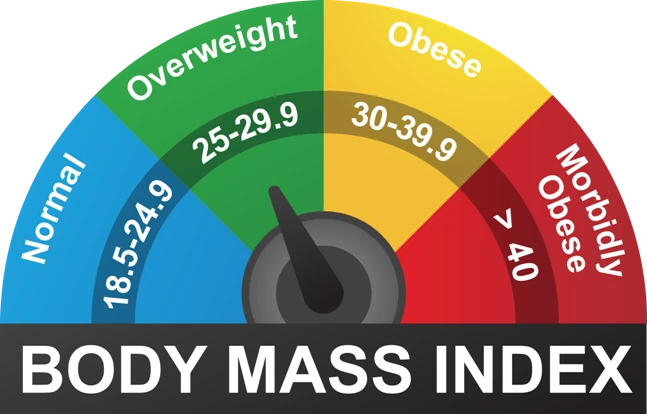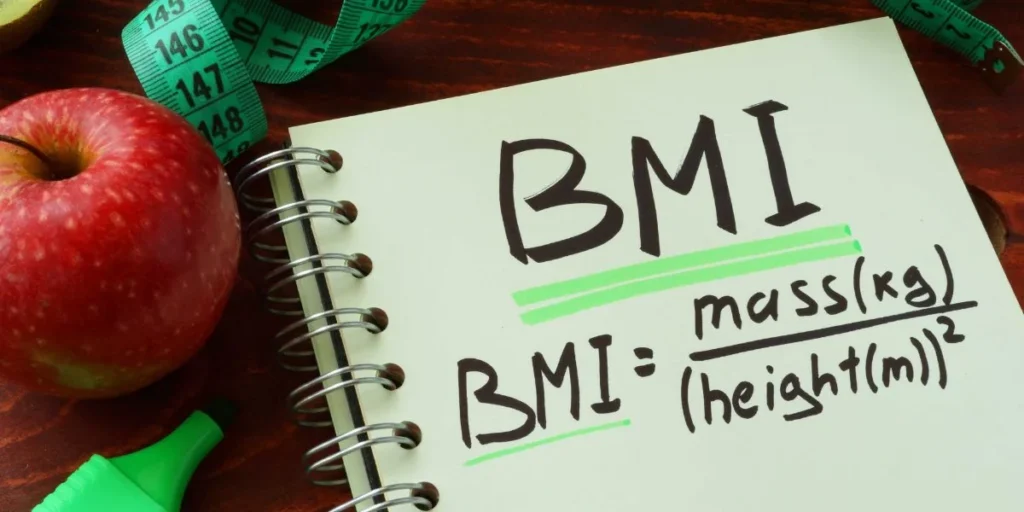The Body Mass Index Calculator (BMI) can calculate BMI value and corresponding weight status. You can find your optimal daily calories, body fat percentage, daily water intake, and muscle mass percentage.
Table of Contents
The average reading time is 10 minutes. The tool was last updated on 19/07/2024.
What is BMI?
Body Mass Index (BMI) is a numerical value derived from an individual’s height and weight. It estimates body fat and is widely used as a screening tool to categorize individuals into different weight status groups.
How is BMI calculated?
To calculate BMI, you must divide an individual’s weight (in kilograms) by the square of their height (in meters). The formula is as follows:
BMI = weight (kg) / height² (m²)
For example, if a person weighs 70 kilograms and is 1.75 meters tall, the calculation would be:
BMI = 70 kg / (1.75 m * 1.75 m) = 22.86
How to use the BMI calculator
If you are an adult aged 20 or older, insert your height and weight, and the calculator will output your BMI value and how much weight you need to lose to have a normal BMI.
The BMI – Health Calculator
Enhanced Health Metrics Calculator
| Metric | Value |
|---|---|
| BMI | |
| Calories Needed | |
| Body Fat (%) | |
| Water Intake (liters) | |
| Muscle Mass (kg) |
Calories Needed: The Harris-Benedict Equation was adjusted with a sedentary activity level multiplier (1.2). Adjust this multiplier based on the user’s activity level if more accuracy is desired.
Body Fat Percentage: The Jackson & Pollock 3-site skinfold equation provides a more accurate estimate but is simplified here for calculation.
Muscle Mass: A simplified James formula was used, which gives a rough estimate based on weight and height.
Understanding BMI categories

BMI categories provide a general indication of an individual’s weight status. The World Health Organization (WHO) has established the following classifications:
- Underweight: BMI less than 18.5
- Average weight: BMI between 18.5 and 24.9
- Overweight: BMI between 25 and 29.9
- Obesity: BMI equal to or greater than 30
These categories serve as a starting point for assessing an individual’s weight. Still, they should be interpreted cautiously as they do not account for muscle mass and body composition.
The limitations of the BMI calculator
While BMI is a helpful tool for population-level assessments, it has certain limitations when applied to individuals. For instance, it does not consider variations in body composition, such as muscle mass, bone density, and fat distribution. As a result, individuals with higher muscle mass, such as athletes, may have a higher BMI despite being healthy and fit. Similarly, older adults may have a lower BMI but a higher body fat percentage due to age-related changes.
Factors Affecting BMI Accuracy
Several factors can affect the accuracy of BMI calculations. These include age, gender, ethnicity, and overall health status. Additionally, BMI may not accurately reflect health risks in specific populations, such as pregnant women or those with certain medical conditions.
Tips for maintaining a healthy BMI
Achieving and maintaining a healthy BMI is crucial for overall well-being. Here are some tips to help you manage your BMI effectively:
- Engage in regular physical activity: Incorporate exercises you enjoy into your daily routine. Aim for cardiovascular conditioning, strength training, and flexibility exercises.
- Follow a balanced diet: Emphasize whole, nutrient-dense foods and limit processed and sugary foods. Ensure you consume an appropriate number of calories based on your age, gender, and activity level.
- Practice portion control: Be mindful of your serving sizes and avoid overeating.
- Stay hydrated: Drink adequate water throughout the day to support your overall health and help regulate your appetite.
- Get enough sleep: Aim for 7-9 hours of quality sleep each night to support your metabolism and overall well-being.
- Manage stress levels: Chronic stress can contribute to weight gain. Find healthy ways to manage stress, such as meditation, exercise, or hobbies.
- Seek professional guidance: Consult a healthcare professional or registered dietitian for personalized advice and guidance on maintaining a healthy BMI.
Importance of regular physical activity
Engaging in regular physical activity offers numerous benefits beyond weight management. Exercise helps improve cardiovascular health, strengthen muscles and bones, boost mood, enhance energy levels, and reduce the risk of chronic diseases. Aim for at least 150 minutes of moderate-intensity aerobic activity or 75 minutes of vigorous-intensity aerobic activity per week, along with muscle-strengthening exercises twice a week.
Role of Nutrition in BMI Management

A balanced and nutritious diet is vital in achieving and maintaining a healthy BMI. Focus on consuming various fruits, vegetables, whole grains, lean proteins, and healthy fats. Limit your intake of processed foods, sugary snacks, and beverages high in added sugars. Consider consulting a registered dietitian for personalized meal plans and dietary recommendations tailored to your needs.
Seeking professional guidance for BMI assessment
While BMI is a helpful tool, it is essential to remember that it is only one aspect of assessing your overall health. For a comprehensive evaluation, consider seeking professional guidance from healthcare providers, such as doctors, nutritionists, or fitness experts. They can provide a more accurate assessment and help you develop a personalized plan to achieve your health and fitness goals.
BMI and its relation to overall health
BMI is strongly associated with various health outcomes. Research has shown that individuals with a higher BMI are at an increased risk of developing conditions such as type 2 diabetes, cardiovascular disease, certain cancers, and musculoskeletal disorders. However, it is essential to remember that BMI alone does not provide a complete picture of an individual’s health, and other factors like lifestyle, genetics, and family history also play significant roles.
Myths and Misconceptions about BMI
There are several myths and misconceptions surrounding BMI. Some common misconceptions include the belief that BMI is a definitive indicator of health, that it applies equally to all populations, and that weight alone determines overall well-being. It is crucial to understand the limitations of BMI and use it as part of a comprehensive health assessment rather than relying solely on this measure.
Strategies for achieving a healthy BMI
To achieve a healthy BMI, adopt sustainable lifestyle changes that promote overall health and well-being. Focus on balancing physical activity, nutrition, sleep, stress management, and self-care. Make gradual changes to your habits and seek support from healthcare professionals, friends, or family to stay motivated.
The psychological impact of BMI
BMI can have a significant psychological impact on individuals, particularly those who fall into the overweight or obese categories. It is essential to approach discussions about BMI with sensitivity and compassion. Promote body positivity, self-acceptance, and a holistic approach to health that encompasses mental, emotional, and physical well-being.
BMI and its association with chronic diseases

Higher BMI values have been linked to an increased risk of chronic diseases such as hypertension, type 2 diabetes, certain cancers, and respiratory disorders. However, it is crucial to remember that BMI is just one factor among many that contribute to these conditions. Lifestyle factors, genetics, and individual circumstances also play significant roles. Focus on adopting a comprehensive approach to health that includes regular medical check-ups, healthy lifestyle choices, and early intervention when necessary.
BMI table for adults
This is the World Health Organization’s (WHO) recommended body weight based on BMI values for adults. It is used for both men and women aged 20 or older.
| Classification | BMI range – kg/m2 |
| Severe Thinness | < 16 |
| Moderate Thinness | 16 – 17 |
| Mild Thinness | 17 – 18.5 |
| Normal | 18.5 – 25 |
| Overweight | 25 – 30 |
| Obese Class I | 30 – 35 |
| Obese Class II | 35 – 40 |
| Obese Class III | > 40 |
Frequently Asked Questions
What is a healthy BMI range?
A healthy BMI range falls between 18.5 and 24.9. However, it’s essential to consider individual variations and consult a healthcare professional for personalized advice.
Is BMI accurate for athletes or bodybuilders?
BMI may not accurately reflect the body composition of athletes or bodybuilders with higher muscle mass. Other assessments, such as body fat percentage, may be more appropriate.
Can BMI be used to diagnose health conditions?
BMI alone cannot diagnose specific health conditions. It is a screening tool that indicates weight status and potential health risks.
Is BMI equally applicable to all age groups?
BMI categories and interpretations may vary for different age groups. Children and adolescents have separate growth charts and criteria for assessing weight status.
Can BMI be improved solely through exercise?
While exercise is essential for overall health, achieving a healthy BMI requires a combination of regular physical activity, balanced nutrition, and lifestyle modifications.

Pashalis Laoutaris
I am a professional writer, fashion blogger, and owner of the site https://laoutaris.com. As a salesperson for more than 20 years, I have experience of 10 years in the fashion industry. I consider myself a true fashionista. I am writing daily blog articles about fashion, tools and converters, and everything you need to know about the current fashion trends.
Share this article
Our Latest Articles
Laoutaris Recommends











I loved as much as you will receive carried out right here. The sketch is attractive, your authored material stylish. nonetheless, you command get bought an edginess over that you wish be delivering the following. unwell unquestionably come more formerly again as exactly the same nearly very often inside case you shield this hike.
Wow, fantastic blog layout! How long have you been blogging for?
you make blogging look easy. The overall
look of your website is wonderful, as well as
the content!